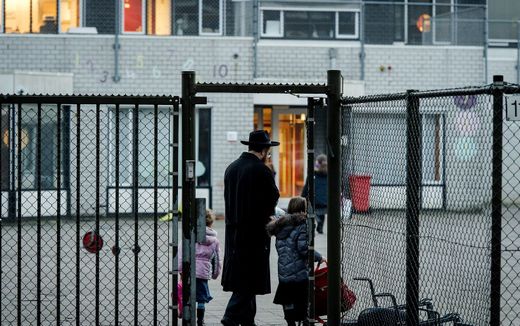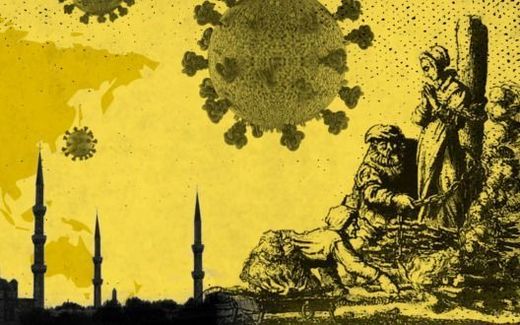France works on plan against “sectarian entrepreneurs”

A man displays a banner, promoting the alleged conspiracy theory website 'reinfocovid', as he rides a bike during a rally to protest against the health pass and Covid-19 vaccines in Nantes, western France. Photo AFP, Damien Meyer
Western Europe
Last Thursday and Friday, the French Ministry of Interior organised several meetings to elaborate on the renewed fight against "sectarian aberrations." According to the French authorities, these aberrations have multiplied during the Covid pandemic and under the influence of social networks.
The objective of the meetings is to create a new roadmap to fight "the new gurus", La Croix writes. Digital platforms, health professionals and other experts are to brainstorm about the so-called "State's response", a plan for the coming ten years to combat sectarian movements.
Government research showed in November 2022 that the number of these movements is growing. Christian Gravel, President of Miviludes, the commission that carried out the study, warns that sectarian aberrations have a remarkable ability "to adapt to the aspirations of the public and to changes in society."
Mankind Project
One of the organisations that are under scrutiny by Miviludes is the Mankind Project (MKP). It is accused of masculinism. It offers "initiatory adventures" for men during weekends. The content of these weekends is secret, La Croix writes.
During special rights, the members of MKP welcome their new brothers with an initiation rite. The men have found MKP via the internet. The website promises participants they will "overcome their resistance, let go, confront their fears and deep wounds" for 550 euros per person.
However, Miviludes, the commission that fights sectarian aberrations, forbids "initiation rites where the individual is pushed to his limits or finds himself in destabilising or even humiliating situations."
And that is what happens during the initiation of MKP. One of the association's officers admits that new members must go "through uncomfortable moments." Miviludes discovered that some activities border "mental destabilisation." New members are deprived of sleep and food and have to be naked for several hours, even when the outside temperature is only 5 degrees.
Examples of these sectarian aberrations are conspiracy theorists and naturopaths, La Croix writes. Digital specialist Tristan Mendès notes that the common factor between them is a "mistrust of what they perceive as being the system." Many of them act individually and publish their own view on life on digital platforms. However, there are also sectarian aberrations that threaten national security by adhering to extreme conspiracy theories.
The number of these people has increased because of the Covid pandemic and the emergence of digital and social networks, La Croix writes. Christan Gravel elaborates that the digital platforms "have encouraged the generalisation of disinformation and have given sectarian entrepreneurs the tools to expand their audience and the number of victims."
Dangers
However, strengthening the strategy to combat sectarian aberrations is not undisputed. The collective L'Extracteur that informs people about the dangers of pseudo-alternatives in health, medicine and food is afraid that the new strategy will be "instrumentalised for political ends."
What is a sectarian aberration?
France does not have an official definition of what a sect, a religion of a sectarian aberration is, La Croix writes. Miviludes defines a sectarian aberration as a "deviation of freedom of thought, opinion or religion, which undermines fundamental rights, security or personal integrity, public order, laws or regulations." Miviludes furthermore specifies that a sectarian aberration aims at "creating, maintaining or exploiting in a person a state of psychological or physical subjection, depriving him of a part of his free will with harmful consequences for this person, his entourage or for society." Especially the factor of mental destabilisation is always present, according to the commission.
As there is no definition of sects, there is also no legislation that criminalises them. Currently, the behaviour of sectarian aberrations is punished if it breaches another part of the law, such as the illegal practice of medicine, fraud, sexual abuse etc.
In 2001, the French government, however, did adopt a law that gives authorities more powers to dissolute legal persons and grants them also more tools to prosecute "fraudulent abuse of the weakness of a person in a situation of psychological or physical subjection."
Risk for churches
The lack of definition of sects and sectarian aberrations can also form a risk for churches, La Croix warns. The renewed fight against the latter may blur the distinction between them.
Sociologist Danièle Hervieu-Léger points out that today's society perceives a sect as a dangerous group for society and its members, she says to La Croix.
For Miviludes, the mental influence of a group or of an individual is decisive in deciding whether a movement is a sect or not. However, La Croix warns, this affects both religious movements and the fields of spirituality, well-being and health.
Related Articles






